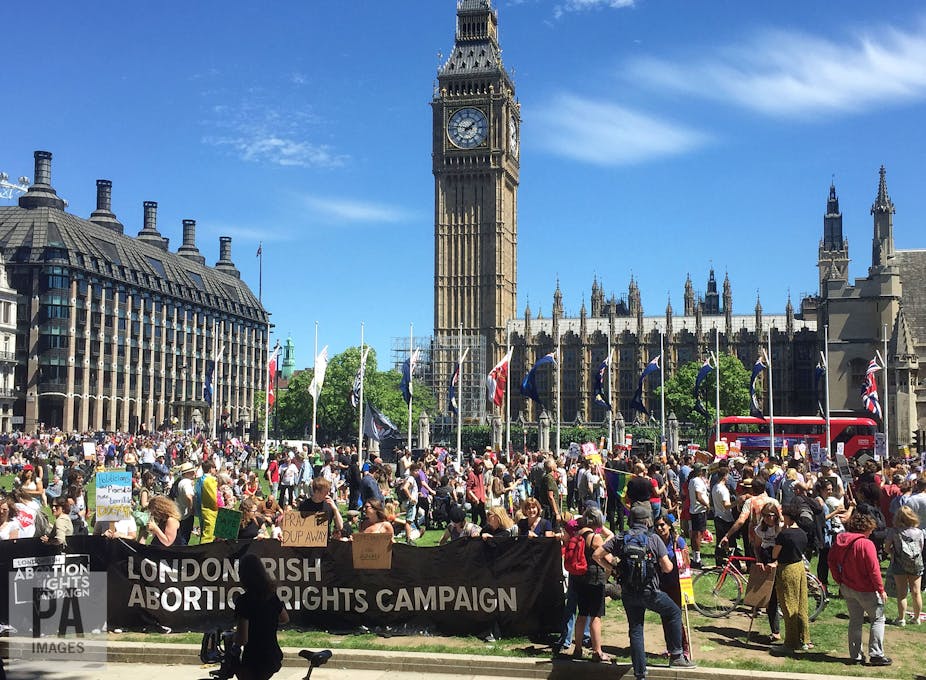For decades, there was a lack of awareness in the rest of the UK that the 1967 Abortion Act did not apply to Northern Ireland. This started to change recently, as organisations such as the UN joined abortion activists in drawing attention to the lack of access to abortion for women in Northern Ireland. This general election result, in which the DUP was thrust centre stage as potential props of a minority Conservative government, is likely to further shine a light on their record.
Women’s rights to abortion in Northern Ireland have been held back significantly by this socially conservative party. DUP MPs have also consistently voted against abortion rights in the mainland – and are likely to do so again in the future.
The 1861 Offences Against the Person Act, under which all abortion is a crime, is the primary legislation governing abortion in Northern Ireland. The 1967 act, which gave increased access to legal abortions in other parts of the UK, was never passed there.
The devolved government in Northern Ireland made no attempt to introduce parallel legislation. The only exception to an absolute ban on abortions is when there is a permanent or serious risk to a woman’s life or mental or physical health. In 2015 and 2016, there were only 16 abortions carried out in Northern Ireland under this exception. This means that the majority of women either have to travel to the British mainland and pay for their treatment or buy abortion pills online. While there are safe medically-supervised sites that they can access, women risk being prosecuted unless they can afford and be able to arrange to travel.
Earlier this year, an attempt to allow women to access abortion in Northern Ireland in cases of fatal foetal abnormality and sexual crime was voted down in Stormont. The lack of access to abortion in these cases was ruled as a breach of women’s human rights by the Belfast High Court. The DUP was among those who refused to allow women to access abortions in these circumstances.
Voting record
Despite the 1967 Abortion Act not applying to Northern Ireland, the DUP has often voted in debates surrounding the extension or restriction of the act in the Westminster parliament.
Recently, the DUP spoke and voted to restrict abortion in a proposed amendment to the serious crime bill in 2015 that was aimed at preventing abortion on the grounds of sex selection. The amendment was rejected after it was revealed that far from protecting female foetuses, it was part of a broader campaign to restrict abortion.
Earlier this year, members of the DUP all voted against a bill to decriminalise abortion in England and Wales. This bill is significant as it sought to repeal the threat of criminal sanctions for abortion and ensure that it is treated as any other health procedure in England and Wales. The bill wouldn’t have changed the law in Northern Ireland – although it would have increased the divide in abortion rights with the mainland.

The DUP’s record on voting on abortion in parliament shows that the party is willing to use its political power to restrict abortion beyond Northern Ireland. This is in sharp contrast with the SNP, which did not vote on decriminalisation because abortion in Scotland is now a devolved issue.
Political football
At this stage, it’s impossible to know whether or not abortion rights could be used a political bargaining chip to keep the Conservative party in power. But there is reason to believe that it might happen, especially in the case of Northern Ireland.
In 2008, there was an attempt to extend the 1967 Abortion Act to Northern Ireland but the Labour government blocked it. It was widely believed that the government took this action in order to get backing for terrorist legislation from the DUP. This is the precedent on which many are currently assessing the current pact proposals with the DUP.
It’s unlikely that a Conservative/DUP pact would break with convention and seek to introduce new legislation on abortion, but that doesn’t mean abortion laws won’t be affected. If the DUP has a strengthened role in Westminster, it may not work as hard as it might otherwise would to restore power sharing in Northern Ireland, which is currently without a devolved government.
This could harm the chances of any future attempts to extend abortion rights, even in the very limited areas of fatal foetal abnormality and sexual crimes. Women seeking abortions will still have to break the law or arrange and pay to travel to the mainland.
In England and Wales, the DUP is likely to continue to vote against abortion rights, and if it holds the balance of power, it is entirely possible that backroom deals will be made to prevent any extension of abortion rights being made by blocking attempts to insert progressive clauses into other bills or even though introducing attempts to restrict abortion in other acts.
The DUP’s homophobic and sexist agenda has been an issue in Northern Ireland for decades, and even while courting the party’s support, the Conservatives are trying to distance themselves from being associated with this. There is already public opposition to any arrangement, especially from those campaigning for better access to abortion.
It’s important now that all those in opposition to the DUP’s position on abortion join forces to work together to defend and extend abortion rights in all parts of the UK.

